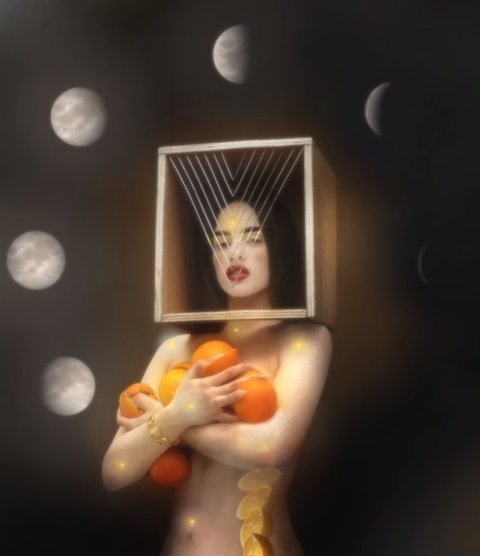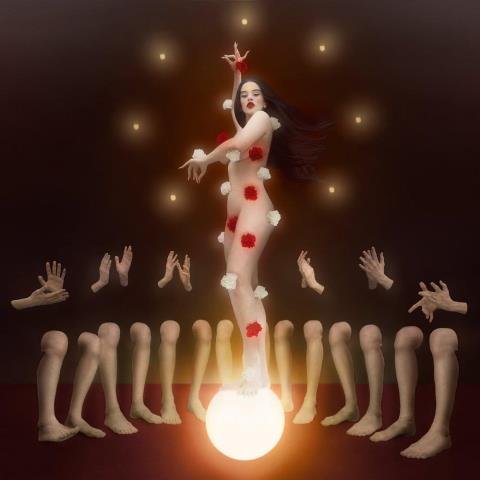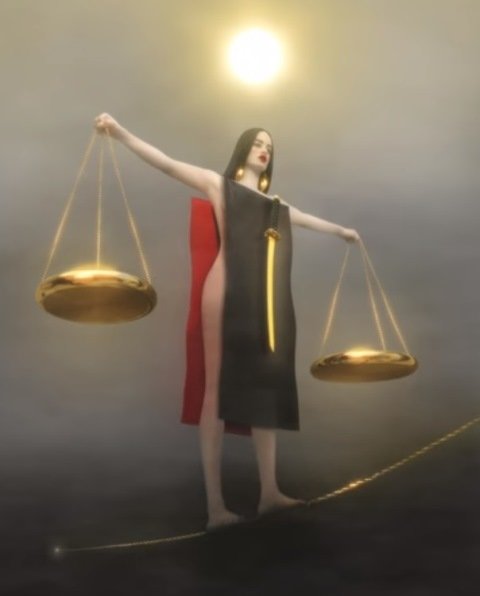El Mal Querer and the narrative thread elaborated by Rosalía (part II)
Hello, Steemians! Today we will continue with the second part of "El Mal Querer and the narrative thread elaborated by Rosalía" (you can read the first part here) in which I will give you my interpretation of the six remaining songs from the album, as well as a reflection on gender-based violence today.
Preso. Chapter 6: Clausura

In this chapter we do not hear the voice of Rosalía, but of the actress Rossy de Palma, who was known as "The Almodóvar girl" due to her roles in different films of the Spanish director Pedro Almodóvar.
Rossy de Palma recites an improvisation in which she tells us about her descent into hell out of love, but she doesn't regret having done it because "she rose up with two angels." She is telling us about the suffering she endured while in a toxic relationship and that the positive thing that came out of it were her two children, who gave her the strength to get out of this situation. She talks about how we get caught up in this kind of relationship without realizing it, and we can really see it objectively when we get out of there, when we get out of hell.
It catches you without realising
You realise when you go out
And you think: "how did I end up here?"
Bagdad. Chapter 7: Liturgia

This is perhaps one of the chapters most open to interpretation and one of the album's most popular songs. It begins with the melody of "Cry Me a River" by Justin Timberlake, who gave permission for Rosalía to use it, with the following lyrics:
And she’s going to burn, if she stays there
The flames rise up to heaven to die
There’s no one else around here
There’s nobody else, she's sitting and clapping
(Translation by me)
This song then speaks from the perspective of someone who observes the protagonist and knows she is a victim. They contemplate her beauty but know she's full of pain, "beautiful but sad." Passersby walk past her without really seeing her, without understanding that she is "trapped in hell." In a hell where she will inevitably perish if she doesn't find a way out.
The song mixes the sacred with the carnal, because its name, "Bagdad," alludes to the Sala Bagdad located in Barcelona, a space focused on sex and pleasure provided by girls who dance to the rhythm of music. Like these girls, the protagonist claps her hands together with the music "in the compass of a bulería it seemed that she was praying" (and so we connect with the "liturgy" —the act of a religious ceremony— announced in the title of the chapter) and we arrive at a beautiful chorus adorned with a choir of white voices, elevating the song to the sacred, in which they repeat to us "She joins the palms of her hands and separates them, she joins the palms of her hands and separates them."
Di mi nombre. Chapter 8: Éxtasis

As the name suggests (Ecstasy), this chapter reflects the passion of the woman. A frenetic moment between her and her husband, a "pause" of violence and a kind of brief honeymoon, which often occurs in abusive relationships. However, not even this situation completely escapes violence (which is why I put "pause" in quotation marks) because the woman, accustomed to abuse and in the middle of the situation in which she finds herself, tells the man:
And tie me with your hair
To the corner of this bed
That even if the hair breaks
I will pretend that I'm tied
That even if the hair breaks
I will pretend that I’m tied
(Translation by me)
It is here that we understand that passion is accompanied by the aggressiveness we have seen in previous chapters. For the woman, getting this pleasure is the only way to momentarily free herself from her prison and, paradoxically, she asks the man to subdue her with his hair, and even if it breaks she will pretend to remain bound, because she knows that his goal is to keep her under his control.
Nana. Chapter 9: Concepción

Thanks to the name of the song (Lullaby), the chapter title (Conception) and the illustration by Filip Custic, we can quickly deduce that the woman has become pregnant after the ecstasy, and sings a lullaby to her child. Suddenly we hear the first verses of the song and Rosalía's voice overflows with great sadness:
At heaven’s door they sell shoes
To the angels that are barefoot
It is then when we know that the child of our protagonist has died and she sings from the affliction, her lullaby is also a farewell. The rain expresses her emotions in the lullaby:
And the rain falls sadly to look at you
Behind every raindrop an angel looks at you
Maldición. Chapter 10: Cordura

After having lost her baby, the woman reaches her breaking point and makes a resolution: she knows that, no matter what, she has to get out of the situation in which she finds herself, she has to get out of hell, out of the prison where she is trapped, before she burns definitively as we were warned in "Baghdad."
They’ve told me there’s no exit
Through the street I’m going
They’ve told me there’s no exit
I gotta find it
Even if it costs my life
Or even if I gotta kill
Evoking the title of the chapter, "Sanity," she expresses that she wishes she was crazy and did not want to love, for she knows that the decision she has made is not easy to execute; after all, she once loved that man and wished to have a life by his side, not knowing that he hid a monster that would fill her life with pain.
After the sounds of swords and shouts of anime-style martial arts (or video games), we hear the confession of the woman who murdered her aggressor:
I’ve left a trail
Of blood on the floor
I’ve left a trail
That leads me to the first day
That I told you that I loved you
To know what you would say
A ningún hombre. Chapter 11: Poder

This is the song of empowerment and the closing of our story. The protagonist assures that she will not allow any man to "dictate her sentence"; that is, she will never let a man control her or hurt her again. She is aware of her own value and, thanks to the experience she suffered because of her aggressor, she will never forget what she had to go through, so she says she will "tattoo his initials on her skin" and thus forever remember the evil he did to her, and that she managed to free herself from it. The woman is free at last.
I won’t allow any man
Dictate my sentence
Only God can judge me
Only to him I owe obedienceUntil you were jailer
I was yours, companion
Until you were jailerI’m going to get tattooed on my skin
Your initial because it’s mine’s
To remind me forever
Of what you did one day
Of what you did one day
Gender-based violence in the 21st century

As I commented in part I of this post, to create the story of this album Rosalía was based on a 14th century novel called Flamenca, in which a man imprisons his wife out of jealousy and mistreats her. The singer from Barcelona took us by the hand to contemplate, step by step, each phase of the relationship and, most importantly: we saw both perspectives. Both the woman and the man have a voice in the story and the songs in which the male character speaks (chapters 2, 3 and 4) bring to the table the machista language that is heard even today in many relationships.
In other words, the album makes us reflect on gender violence today because, unfortunately, El Mal Querer is a current theme with which many of us can identify. In 7 centuries these symptoms are still maintained and there are many women who are victims of men who think they own them, their lives, their bodies and their decisions.
When you reflect on this subject when listening to Rosalía's album, pay special attention to the lyrics and the video of "Pienso en tu mirá," which is the third chapter of the album, "Celos." As I mentioned in the first part, this song perfectly exemplifies how phrases that can be mistaken for romantic ("So pretty that threatens/ When you shut up you scare me/ As cold as snow/ When it falls from the sky/ When you walk out the door/ I think you'll never come back/ And if I don't grab you hard/ I feel it will be my fault") actually hide a violent and obsessive language.
Thank you, Rosalía, for bringing such an important message to the audience through your art. All women deserve a buen querer (good romance) and that we are respected, not because we are women, but simply because we are human beings who own our lives, our bodies and our destiny.